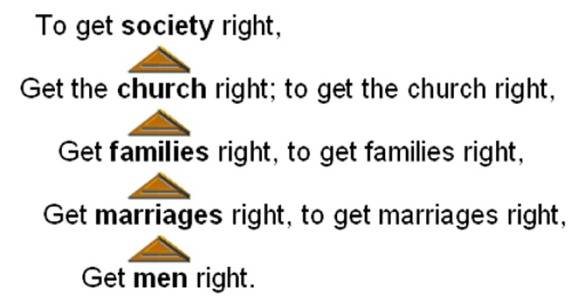Presidential candidates always promise change; one says he can deliver and the other says he can’t. We crave what the word represents, with a hope that perhaps one man truly can make a difference. But how will America experience real change? We have to change the society! Consider the information in the box, on how to get society right…
 In his book, Wild at Heart, John Eldridge tells us that since men are made in the image of God, they understand their own natures by looking at how God has expressed His own nature. He mentions three expressions: a warrior, a lover and an adventurer.
In his book, Wild at Heart, John Eldridge tells us that since men are made in the image of God, they understand their own natures by looking at how God has expressed His own nature. He mentions three expressions: a warrior, a lover and an adventurer.
- As a warrior, God battled satan for the souls of men.
- As a lover, Jesus gave himself for his bride, the church.
- As an adventurer, God created humanity and risked everything by giving us freedom to reject him.
So, the author contends that men are looking for a battle to fight, a beauty to rescue, and an adventure to live.
In the series, Quest for Authentic Manhood, Robert Lewis teaches that men need to look at the example of Jesus’ masculinity as their test for true north. We either live in the shadow of the first Adam (mere existence) or the second Adam (a life-giving spirit) (see 1 Corinthians 15:45-49, Romans 5:17-19). The shadow a man chooses determines the kind of man and father he will become.
Why is Men’s Ministry so important? Because so much is at stake! Men are in a battle for their souls, their marriages, their families, and you see that society is ultimately affected. Let’s change America together; leaving no man left behind.